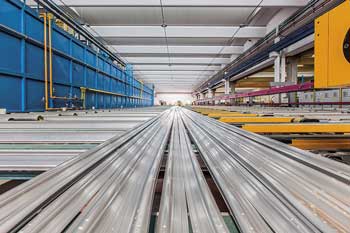Sepal: a Complete Service for Industry
Three extrusion presses and state-of-the-art plants for anodizing and the coating of extrusions. Over the past few years Sepal invested constantly to broaden as much as possible the range of products and surface finishing. Alberto Bertoli, the company’s managing director, tells us about this.
by Alberto Pomari
Sepal, Società Estrusione Profilati in Alluminio, founded in 1973 by Domenico and Ercole Bertoli, is now based in Lograto, a few miles from Brescia, where the factory moved in 2005 from its previous, historical headquarters in Gussago. Once a unit mainly focused on third-party extrusions, Sepal rapidly developed during the past few years building a clear identity in the industry and conquering a relevant market share; the product range grew from a qualitative as well as quantitative standpoint and from the first 1350-ton press, no longer functioning, it now has three presses, a 2500-ton press and two 1870-ton presses, with a total production capacity of over 28,000 tons a year. There is a lot to be discovered about this concern, and we talked about it with the company’s current managing director, Alberto Bertoli, who followed his father’s tracks in the aluminium field.
This is clearly a young company, there is vitality and enthusiasm in a highly stimulating work environment. How did you achieve this?
This is the second generation operating in a production segment which, in Italy and Europe, went through its great and often irregular grow phase decades ago. Now we are going through a phase of reflection: those who managed to live through the recent crisis necessarily had to provide the company with a solid structure, based on solid values from all standpoints, one being a good corporate atmosphere, which you felt upon entering the factory, and which is the outcome of a group work mentality and of the strategies and shared ideas which were built during these years: it is an immaterial asset, which, in addition of course to many other aspects, determines a company’s success.
How would you evaluate the aluminium extrusion market in 2017?
Last year we reached a net production of over 20,000 tons, one of the best results ever, and 2017 was a very positive year, we increased our sales by more than 12% with respect to 2016, with positive sales margins. We are therefore satisfied on account of these figures and of the positive acknowledgment on the market’s part, but in any case we are always alert. Ours is a dynamic, flexible concern, structured to reach reasonable and realistic aims, without rushing, it is well known that ours is a difficult and competitive industry, both nationwide and internationally, where we often have to face a very unfair competition which does not always go by the correct market rules.
How is Sepal acting on foreign markets?
Our export market share reached 35% on our revenues and is increasing. By means of the strengthening of our sales force, we increased the share of exports to German, above all, but even to France and other European countries. Only our complete range allows us to approach foreign markets successfully.
What do you mean by “complete range” and what differentiates Sepal with respect to its competitors?
Our investments have been focused on a complete service to clients in a somewhat traditional way, which means not just providing aluminium profiles but also their surface finishing, for this reason our plant includes, besides extrusion presses, systems for anodic oxidation and coating of profiles of the highest quality levels. In 2013 we installed in the Lograto site a new fully automatic anodizing plant which can produce up to 8,000 tons a year. Using the most modern process control systems, we can provide finishing with layers of oxide up to 25 microns thick in standard colours, but also pre-treatments such as scotch brite, chemical glazing, sandblasting, brushing and polishing; in 2013 we also added to the anodizing plant a powder coating plant. Advantages for our clients were immediately evident, with very limited handling of the profiles, simpler deliveries, a drop in complaints regarding quality, certified and guaranteed quality standards.
Any other strengths? New projects?
Two years ago we created an innovative packaging system with an automatic plant which wraps up in polyethylene film our extruded profiles, reducing the use of traditional wooden ledgers. Packaging is therefore clean, protective and easy to handle. We are also installing a brand new automatic warehouse, which will act as logistic support for presses, finishing plants and for our clients: by reducing the time and space required, the profiles will move around in the company in an orderly fashion, greatly improving the well-known issues of traditional warehousing and handling.

